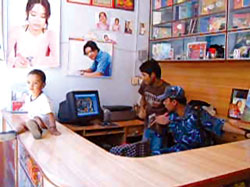|
|
| VIDEO PARLOUR: An armed police sentry watches a Maoist video of a battle in Libang recently. |
LIBANG-As the ceasefire takes hold, the action shifts to Kathmandu and many of us have forgotten Rolpa, the cradle of the Maoist revolution.
More than 700 Rolpalis lost their lives in the past ten years of conflict, making this the district with the highest casualty level. Many were killed during police offensives in 1997-98 to root out the Maoists. Even today, people talk about 'Romeo' and 'Kilo Sierra 2' in hushed tones, of how their brothers and neighbours were killed on mere suspicion of being Maoist sympathisers. Others were killed by Maoists, and those that didn't flee to Libang, have lived here ever since.
Madav Acharya, district chairman of the NC, says his wife never let him go even on the terrace fearing Maoist snipers from the surrounding hills would get him. But for now Rolpalis, whether they live in the government-controlled fortress capital or the Maoist-dominated hinterland, are happy that the fighting has stopped. The war-weariness is palpable and there is a deep yearning for peace.
At a photo shop, Prem Bahadur Buda is cautiously optimistic. "Things are much better but the Maoist activities are almost the same," he says, "we do not have enough food for ourselves yet we have to feed the Maoists or pay them Rs 50 a month."
The shop has a large portrait of Princess Shruti with her daughter, next to a picture of the daughter of Maoist negotiator Krishna Bahadur Mahara, a Rolpa native. On the street outside I overheard a 12-year-old boy threaten a retired British Gurkha solider that he had a socket bomb in his bag.
People are less afraid to talk. Hari Khadki opens out: "There is a ceasefire, yes, but they still force us to work on the Shahid Marg. If we don't go we have to pay Rs 5,000 fine." The 93km 'martyr highway' connects Thawang with Nuwagau.
Shiva Chhetri, proprietor of Shiva Shakti Hotel in Libang shows me the barbed wire fence (tar bar) surrounding government buildings, party offices, and private schools. The barbed wire never really stopped the Maoists who had the run of the place, extorting money and abducting those who didn't pay. With the ceasefire, the Maoists walk around openly and extortion is now called 'tax collection'. The tar bar is a grim reminder of a senseless war and its legacy.
The NC's Acharya says he is happy about the ceasefire, as there is more security. But he is worried that the Maoists still haven't allowed his party workers to go back to their home villages. The UML's Man Singh Dangi says the people of Rolpa have learnt to live with conflict and urges that the constituent assembly elections not be delayed because it may jeopardise the peace process.
"Rolpa suffered the most during this war," muses Krishna Gharti of the NC-D, "unless Rolpa develops, the rest of Nepal won't either." Gharti, Dangi, and Acharya say they are convinced the Maoists are genuine about wanting peace, but on their own terms.
Is that true, we asked the Maoists. "Parliament proclamations are not enough, we need to stop all exploitation," says Nava Raj Acharya, district rebel leader who now has an office in town. He confesses that his party has made mistakes and knows that is why the Rolpalis still don't trust the Maoists completely. But Acharya is convinced 95 percent of the people of Rolpa will soon support them.
We asked Narendra Batha Magar, a Maoist militia member why his group was still recruiting and forcing children to join the movement. "No one will listen to us if we give up arms right away," he said, adding, "there may be some violations of the code of conduct but that is because we haven't had a chance to talk to our cadre."
On the ride out of Rolpa, a soldier at a checkpoint wanted to know the prospects of peace. An FM radio was highlighting news of Pushpa Kamal Dahal's talk of an 'October Revolution' and Baburam Bhattarai threatening an 'urban uprising'. The soldier's face fell. He pointed out an old man at a paan shop nearby, and said: "They beat him up because he didn't pay them their tax."




